高职高专实用英语教程教案Unit_4
- 格式:doc
- 大小:126.50 KB
- 文档页数:9
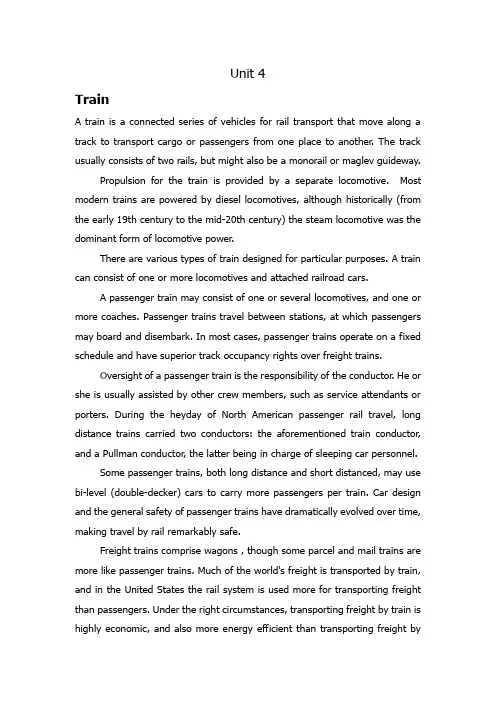
Unit 4TrainA train is a connected series of vehicles for rail transport that move along a track to transport cargo or passengers from one place to another. The track usually consists of two rails, but might also be a monorail or maglev guideway.Propulsion for the train is provided by a separate locomotive. Most modern trains are powered by diesel locomotives, although historically (from the early 19th century to the mid-20th century) the steam locomotive was the dominant form of locomotive power.There are various types of train designed for particular purposes. A train can consist of one or more locomotives and attached railroad cars.A passenger train may consist of one or several locomotives, and one or more coaches. Passenger trains travel between stations, at which passengers may board and disembark. In most cases, passenger trains operate on a fixed schedule and have superior track occupancy rights over freight trains.Oversight of a passenger train is the responsibility of the conductor. He or she is usually assisted by other crew members, such as service attendants or porters. During the heyday of North American passenger rail travel, long distance trains carried two conductors: the aforementioned train conductor, and a Pullman conductor, the latter being in charge of sleeping car personnel.Some passenger trains, both long distance and short distanced, may use bi-level (double-decker) cars to carry more passengers per train. Car design and the general safety of passenger trains have dramatically evolved over time, making travel by rail remarkably safe.Freight trains comprise wagons , though some parcel and mail trains are more like passenger trains. Much of the world's freight is transported by train, and in the United States the rail system is used more for transporting freight than passengers. Under the right circumstances, transporting freight by train is highly economic, and also more energy efficient than transporting freight byroad. Rail freight is most economic when freight is being carried in bulk and over long distances, but is less suited to short distances and small loads.译文列车列车是铁路运输中连接起来的一组车辆,它们在轨道上行驶,从一地向另一地运输旅客或货物。
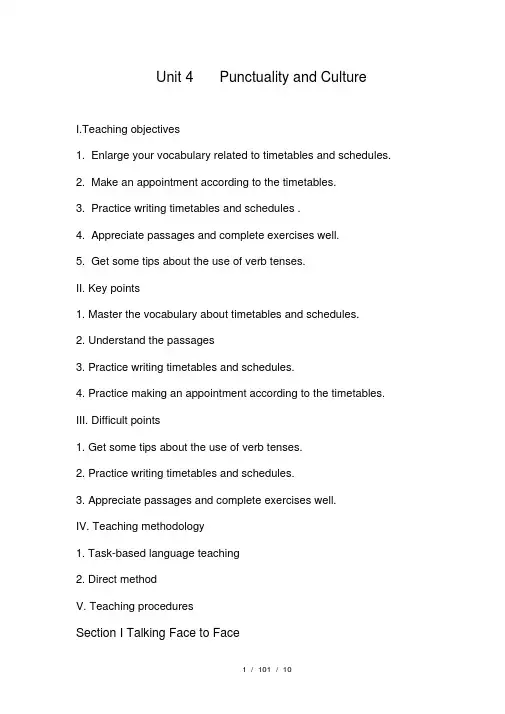
Unit 4 Punctuality and CultureI.Teaching objectives1.Enlarge your vocabulary related to timetables and schedules.2.Make an appointment according to the timetables.3.Practice writing timetables and schedules .4.Appreciate passages and complete exercises well.5.Get some tips about the use of verb tenses.II. Key points1. Master the vocabulary about timetables and schedules.2. Understand the passages3. Practice writing timetables and schedules.4. Practice making an appointment according to the timetables. III. Difficult points1. Get some tips about the use of verb tenses.2. Practice writing timetables and schedules.3. Appreciate passages and complete exercises well.IV. Teaching methodology1.Task-based language teaching2.Direct methodV. Teaching proceduresSection I Talking Face to FaceImitating Mini-Talks1.Work in pairs. Practice the following mini-talks about schedules and timetables.Acting out the Tasks2.Work in pairs and act out the tasks by following the above mini-talks.Key for reference:1)Task:Look at the flight timetable in Exercise 3. Ask about the departure and arrival time.2)Task:Look at the flight timetable in Exercise 3 .Ask about the Tuesday flight for Hong Kong.3)Task: Look at Mark’s schedule in Exercise 3. Call to ask Mark for a change of an appointment.4)Task:Look at Mark’s schedule in Exercise 3. Ask to make an appointment to see Mark on Wednesday.5)Look at Mark’s schedule in Exercise 3. An old friend in Hong Kong asks to see Mark on Thursday .Studying Timetables and Schedules3.Timetables and schedules a re important in planning our activities. Read the following timetable and schedual and try to use the information to practice short dialogues.Following Sample Dialogues4. Read the following sample dialogues and try to perform your own tasks. Putting Language to Use5. Mark is going to Harbin to see the Ice Lantern Exhibition. He is asking Miss Wang to help him to find out about the train timetable. Suppose you are Mark. Read aloud the following dialogue with your partner by putting in the missing words.6. Now imagine you are a receptionist in a hotel. Mr. Johnson is asking you about information of your hotel. Fill in the blanks according to the clues given in the brackets. Then act it out with your partner.Section II Being All EarsLearning Sentences for Workplace Communication1.Listen to 10 sentences f or workplace communication cross-referenced w ith their Chinese translations.Script: (e.g) 1). Would you please arrange a meeting for me with Dr. Johnson?2). I’d like to make an appointment to see Mr. Black.3). I’d like to confirm our meeting tomorrow afternoon.4). The train is due to arrive at 9 o’clock, but it has been delayed for one hour.5). I’d like to see you tomorrow if you have time.2.Listen to the following sentences for workplace communication in Column A and match each one with its Chinese version in Column B.3.Listen to 6 sentences f or workplace communication and choose their right responses.Handling a Dialogue4.Listen to a dialogue and decode the message by filling in Susan’s schedule according to what you have heard.Understanding a Short Speech/Talk5.Now listen to a short speech/talk and fill up the blanks according to what you have heard.The words in brackets will give you some hints.6.Listen to the speech/talk again and complete the information in Column A with the right choices in Column B.Section III Trying Your HandPracticing Applied Writing1.Fill in the office hours making use of the information in the passage t hat follows.2.Translate the following schedule into Chinese, using the data bank in the Workbook for reference.3.Write an English schedule for the coming week according to your circumstances.Writing Sentences and Reviewing Grammarplete the following sentences, using the right verb forms.5.Correct the errors in the following sentences.6.Translate the following sentences into English.1)This is the most interesting novel he has ever written.2)The students were still laughing when the teacher came into the classroom.3)I haven’t finished the book yet, so I don’t want to return it to the library.4)Is this the first time you have come to China?5)Even if it rains in the afternoon, I will go downtown with you..6)I didn’t hear what you said just now. I was watching TV.7)I know Mr. Wang is living in Nanjing at the moment.8)The little town lies at the foot of a mountain.Write and Describe a Picture7. Suppose this is your schedule for the coming three days. Write a paragraph of about 100words based on the information given in the schedule. You may start the passage with the sentence: I’ve got a very busy schedule.Section IV Maintaining a Sharp EyePassage onenguage Points:A.Explanation of Difficult Sentences1)One of the cultural differences that tend to annoy Americans has to do with understanding of punctuality.Analysis:Has to do with is a phrase meaning has a special relationship with. It is the predicate of the sentence. That introduces a restrictive relative clause modifying differences.2)Arriving at my office 30 minutes after the appointment , I found a voice message telling me the team was waiting for me in the meeting room. Analysis: Arriving at... is a present participle phrase used as an adverbial of time. Telling me(=that told me)is a present participle phrase modifying message. The team was waiting for me in the meeting room is the object clause of the verb telling with that omitted.3)Being afraid that I had missed the appointment , I hurried in, and found them happily chatting together.Analysis:Being afraid that I had missed the appointment is a present participle clause used as an adverbial of cause. Chatting is a present participle used as the object complement.4)...if you start late you won’t be able to finish the business at hand without running beyound the scheduled ending time.Analysis:If introduces an adverbial clause of condition. Note that the pattern you won’t be able to ...without running beyound means you will... by running beyound...B.Important Words1)punctuality n. the quality of adhering to an appointed time2)pay v. be worth it3)annoy v.to disturb or irritate especially by repeated acts4)punctual a.arriving exactly at the time appointed5)attitude n. a mental state involving feelings, beliefs and values6)behavior n.manner of acting2.Passage Translation3.Read and Think: Answer the following questions according to the passage.4.Read and Complete1)Complete each of the following statements with words or phrases from thepassage.2)Fill in the blanks with the proper words or expressions given below,changing the form if necessary.5.Read and Translate6.Read and SimulatePassage twonguage Points:A.Explanation of Difficult Sentences1)Those traveling or doing business abroad should always find out the answer to this question.Analysis: traveling or doing business abroad (=who travel or do business) is a present parciple clause used as the post-modifier of those.2)It is also supposed etiquette to arrive a little late for a party, which I have never ever understood.Analysis:supposed is a past participle, used as an adjective here. Which introduces a non-restrictive relative clause and which itself refers to the whole main clause.3)... When a bridge or major high way shuts down, there may not be any way to get where you are going.Analysis: the infinitive phrase to get where you are going is the post-modifier of the noun way.4)So I would have to say that I am always early, except when I can’t get there at all, in which case I will call as soon as I know I am going to be late. Analysis: In the object that-clause, except introduces a when- clause, an adverbial clause of time, indicating an exceptional situation. In which case introduces a non-restrictive relative clause,which refers to the exceptional when-clause.B. Important Words1)standard n. a basis for comparison; a reference point agaist which other things can be evaluated2)etiquette n.the formal rules for polite behaviors3)suppose v. to believe especially on uncertain or tentative grounds; used to say what was or is expected or intended to happen4)absolutely ad. completely and in every way5)insult n./v. A remark or action that is offensive or deliberately rude; to offend someone by saying or doing something they think is rude6)case n. an example of a particular situation , problem, etc.2.Passage Translation3.Read and Judge: True/False4.Read and Translate: Translate the following sentences into Chinese.1)按照美国人的标准,巴西人不算守时。
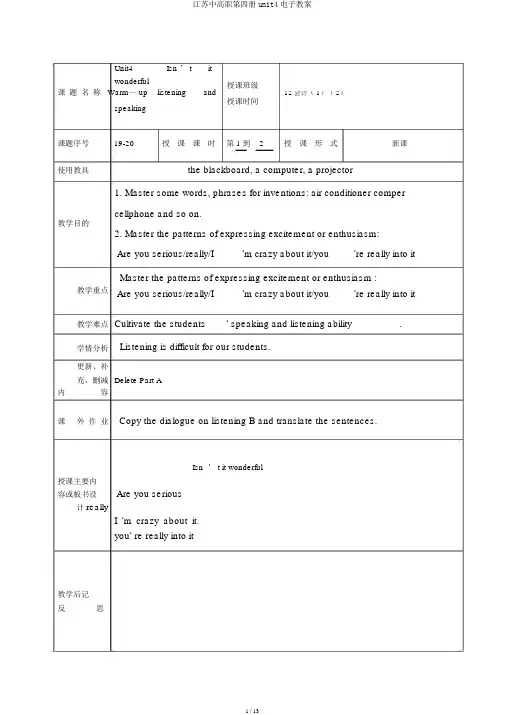
Unit4Isn ’ t itwonderful授课班级课题名称 Warm— up listening and12 会计( 1)( 2)speaking授课时间课题序号19-20授课课时第1到__2_授课形式新课使用教具教学目的the blackboard, a computer, a projector1.Master some words, phrases for inventions: air conditioner comper cellphone and so on.2. Master the patterns of expressing excitement or enthusiasm:Are you serious/really/I’m crazy about it/you’re really into it Master the patterns of expressing excitement or enthusiasm :教学重点Are you serious/really/I’m crazy about it/you’re really into it 教学难点Cultivate the students’ speaking and listening ability.学情分析Listening is difficult for our students.更新、补充、删减Delete Part A内容课外作业Copy the dialogue on listening B and translate the sentences.Isn ’ t it wonderful授课主要内容或板书设Are you serious计reallyI ’m crazy about it.you’ re really into it教学后记反思主要教学过程及步骤Step 1: Lead-in and Warming up Lead into the newlesson by T: There are many inventions in the world ,can you name some of discussing some it inventions to Ask some students to tell us some great inventions in the world .the class.Then look at the pictures on page56 together.Rank someof the greatest inventions of the 19th and 20th century,rankthem in the order of importance.Step 2: DiscussionDiscuss with your partner why are those inventions in activity 1important ornot important ,share your answer with the class.You can use the following phrase to organize your speech:I think ----------is the most important invention,because we can use it in -----------,so----------Ask students to express the ideas of what they know about the inventions.Step 3: Listening and Speaking (isn’t it wonderful)1 Listen to the conversation and circle the best answer Pre-listeningAsk them to go through the choices before listening .Underline the difficult words and expressions. Then teacher analyzes them for students.And then predict the answer for each question.While-listeningAsk students to listen carefully to the material.Keep notes for important to the dialogue .Listen to the tape and finish the related tasks.Post-listeningCheck the answer with the partner, and exchange ideas to discuss who is right with the unsolved question in mind, listen to the tape the next their answers and explain the reasons and write down some sentences if it is necessary.2 Complete the conversation with the sentences in the and check the answer .then practice the conversation with a partner.First ,ask them to read the five sentences in the box and explainthe meaning of some sentences if it’s necessary.Second, givethem 3 ’to prepare and try to fill in the blanks inthe dialogue.Third ,listen to the dialogue and check their answers .Finally ,explain the dialogue and translate some sentences if it ’s necessary.Conclude : conversation strategyExpressing excitement or enthusiasm such as :Are you seriousReallyWow,yes,oh,goodStep 4 Oral practice1Work with a partner ,role-play the following situations,usethe conversation strategy in activity 5.Situation 1Your friend bought an iPod and is telling you how great it is.Situation 2You are just back from a wonderful trip to Yunnan,now you are telling your friend about the beautiful scenery there.Step 5HomeworkPreview passage A.To consolidate the useful expressions.课题名称Unit 4授课班级12会计( 1)( 2)Reading授课时间课题序号21-22授课课时第3到__4_授课形式 Speaking Reading使用教具Blackboard, a computer, a projector1 Master the words in the text.2Learn to read using reading skill“Scanning ,Skimming”;教学目的3Cultivate the students ’ ability to search and deal with theinformation.1Learn to read using reading skill“Scanning ,Skimming” .教学重点2Cult ivate the students ’ ability to search and deal with theinformation.教学难点Find key words and get the main idea of each paragraph.学情分析How to find the answer after reading更新、补充、删减内容课外作业New words and phrasesDisposable授课主要内Come back容或板书设High-tech计LaptopProgrammeIn one ’s opinion教学后记反思课堂教学安排Step 1: Greetings and lead-inQuestion for them discussion:How do you think about the inventions used in daily life such as laptop Do you think it is useful or not First,we lead into the class by situationalteaching method. .Step 2: Pre-readingPresentationT: Now, today we’ll learn a passage about the topic . That isa you know what is a blogWho write blog every dayAsk one student to tell us what a blog is,then let him or hershare his or her blog address.Step 3 While-reading1Scanning(1)Searching for information(2)Go over the text and find out what is Jan’s favourite invention .(3)Listen to the tape and find out any new words.(4)Listen to the tape and read those new words as following:ElectronicGadgetCellphoneRechargeHigh-techLaptop(5)Match the words with their explanations on page61.2Skimming(1)Key sentencesGrasp these key sentences:I started working for a newspaper thirty years ago,before all the modern electronic products.Voice mail is another problem .I have a map programme on my laptop that’s really useful.Y should think about these gadgets, and decide if they really make your life better.Ask them if they have any questions,if they have any other questions,give them 5 minutes to ask questions and explain it tothem.(2) Key wordsHow many paragraphs are there in this passage What does each In reading part ,task-basedteaching method is used to spreadthe difficult points so as to improve the students ’reading ability.Use scanning to search for detailed information.Before the scanning, requirementsshould be told tothe students.paragraph talk about Summarize the main idea of each paragraph in words as less aspossible.(3) SubtitleGive the passage a subtitle.Step 5 Post-reading1 SummarySummarize the passage according to the information in the chart. Ask students to summarize the passage in their own words thendo exercise 3 on page 61,choose the best summary for the text.Step 6 HomeworkWrite a blog about how did you spend today.We use skimming to help students get the main idea of the passage. This is the teaching difficult points.Summarize the passage according to the table. And every group chooses a representative to show the summary.课题名称Unit 5 Reading 授课班级12 会计( 1)( 2)授课时间课题序号23-24授课课时第5到__6_授课形式新课使用教具Blackboard, a computer, a projector1 Improve the Ss’ reading ability.教学目的2 Cultivate the students ’ ability to search and deal with theinformation.教学重点教学难点学情分析更新、补充、删减内容Para3,how does the microwave oven work Para3,how does the microwave oven work Understanding the passage is difficult. Language points in reading part.课外作业Finish the exercises on P63 of the exercise book.授课主要内容或板书设计New words and phraseMicrowaveEngineerGenerateHigh -frequencyIntriguePopcornKernel教学后记反思课堂教学安排Step 1: Lead-inFree talkT: Morning, everyone! How are you todayIs there a microwave oven in your house D o you often use it in daily lifeDo you want to know who invent it Today we’ll learn a passage about the invention of the microwave oven.F irst,we lead into the class by asking questions.Step 2: Fast readingwords:Listen to the tape and read the following new words in the passage: MicrowaveEngineerGenerateHigh -frequencyIntriguePopcornkernelsentencesTask1:Read the text quickly, and find the key sentences for each paragraph.Ask students to read the passagequickly to find the key sentencesof each paragraph.1) when the American engineer let his chocolate bar get close toan electronic tube that generated high-frequency radio waves,it started to melt.2) If an egg can be cooked that quickly ,why not other foods3)spencer designed a metal box with a hole into which he fed microwave power.4) Engineers went to work on Spencer’ s hot new idea.Task 2up the important evens in the invention of the microwave oven according to task 1,then fill the blanks in the form on page 63.Step 3: Language pointsListen to the passage paragraph by paragraph. At the same time, ask students to imitate the pronunciation.Through the presentation of the example, summarizing the rule that not allthe key sentences are the first sentences.(1)Listen to the 1st paragraph, and then ask the students to read it.Percy Spencer had no ides what might happen when he brought candywith him into his microwave lab in 1946.Have no idea :不知道Ask the students . I have no idea how to surf the Internet.to listen to the (2)Listen to the 2nd paragraph, and then ask the students to read it.passage paragraphThe curious colleague moved in for a close look just as the egg by paragraph.At exploded and splashed all over his amazed face.the same time,ask 这个好奇的同事凑近点想看清楚,这时正好鸡蛋爆炸了,溅了他一脸。
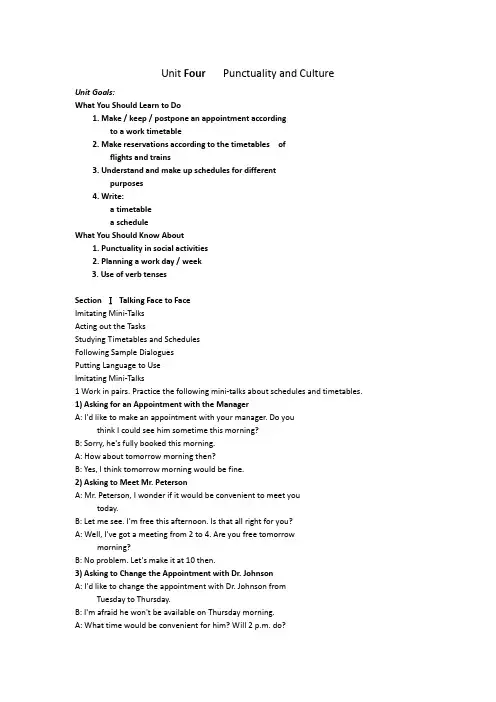
Unit Four Punctuality and CultureUnit Goals:What You Should Learn to Do1. Make / keep / postpone an appointment accordingto a work timetable2. Make reservations according to the timetables offlights and trains3. Understand and make up schedules for differentpurposes4. Write:a timetablea scheduleWhat You Should Know About1. Punctuality in social activities2. Planning a work day / week3. Use of verb tensesSection ⅠTalking Face to FaceImitating Mini-TalksActing out the TasksStudying Timetables and SchedulesFollowing Sample DialoguesPutting Language to UseImitating Mini-Talks1 Work in pairs. Practice the following mini-talks about schedules and timetables.1) Asking for an Appointment with the ManagerA: I'd like to make an appointment with your manager. Do youthink I could see him sometime this morning?B: Sorry, he's fully booked this morning.A: How about tomorrow morning then?B: Yes, I think tomorrow morning would be fine.2) Asking to Meet Mr. PetersonA: Mr. Peterson, I wonder if it would be convenient to meet youtoday.B: Let me see. I'm free this afternoon. Is that all right for you?A: Well, I've got a meeting from 2 to 4. Are you free tomorrowmorning?B: No problem. Let's make it at 10 then.3) Asking to Change the Appointment with Dr. JohnsonA: I'd like to change the appointment with Dr. Johnson fromTuesday to Thursday.B: I'm afraid he won't be available on Thursday morning.A: What time would be convenient for him? Will 2 p.m. do?B: Yes, that'll be fine.4) Asking About the Working Hours of a Ticket OfficeA: What are the office hours?B: Well, the office hours are from 9 a.m. to 6 p.m.A: Do you work on weekends?B: On Saturday the office is open from 9 a.m. to 3 p.m., but on Sunday we are closed.5) Asking About the Flights for MacaoA: Do you have flights to Macao?B: We have only one flight to Macao each week, at 1:40 p.m.Wednesday.A: When does it arrive in Macao?B: At 3:40 p.m.2 Work in pairs and act out the tasks by following the above mini-talks.1 Task:Look at the flight timetable in Exercise 3.Ask about the departure and arrival time2 Task:Look at the flight timetable in Exercise 3.Ask about the Tuesday flight for Hong Kong3 Task:Look at Mark's schedule in Exercise 3.Call to ask Mark for a change of an appointment.4 Task:Look at Mark's schedule in Exercise 3.Ask to make an appointment to see Mark on Wednesday.5 Task:Look at Mark's schedule in Exercise 3.An old friend in Hong Kong asks to see Mark on Thursday.Studying Timetables and SchedulesRead the following sample dialogues and try to perform your own tasks.Putting Language to UseSpeak and CompleteMark: Miss Wang, I want to 1 __________ an evening train to Harbin so thatI can get there the next morning. Do you know the schedule?Miss Wang: Yes. I have got a 2 __________________ here.Mark: Is there a train leaving around 6?Miss Wang: 3 ______________ one at 6:15.Mark: When will it get there?Miss Wang: 4 ______________ at about 8 next morning.Mark: That's the one I need. Thank you very much.Miss Wang: You are 5 ______________.SECTION II Being All EarsLearning Sentences for Workplace CommunicationHandling a DialogueUnderstanding a Short Speech / TalkLearning Sentences for Workplace Communication1 Listen to 10 sentences for workplace communication cross-referenced withtheir Chinese translations.arrange 安排confirm 确认due 规定(到达) 的delay 耽搁2 Listen to the following sentences for workplace communication in Column A andmatch each one with its Chinese version in Column BKey:1-i, 2-j, 3-d, 4-c, 5-f, 6-e, 7-h, 8-g, 9-a, 10-b3 Listen to 6 sentences for workplace communication and choose their right responses4 Listen to a dialogue and decode the message by filling in Susan's scheduleaccording to what you have heard.5 Now listen to a short speech / talk and fill up the blanks according to what youhave heard. The words in brackets will give you some hints.6 Listen to the speech / talk again and complete the information in Column A withthe right choices in Column B.SECTION III Trying Your HandPracticing Applied WritingWriting Sentences and Reviewing Grammar1 Fill in the office hours making use of the information in the passage that follows.2 Translate the following schedule into English, using the data bank in theWorkbook for reference.Writing Sentences and Reviewing Grammar3 Complete the following sentences, using the right verb forms4 Correct the errors in the following sentences.5 Translate the following sentences into English6 Suppose this is your schedule for the coming three days. Write a paragraph ofabout 100 words based on the information given in the schedule. You maystart the passage with the sentence: I've got a very busy schedule.KEYS: I've got a very busy schedule. I'm catching the 9:45 flight on October 8 and arriving in Shanghai at 2:00 in the afternoon. Bob is meeting me at the airport. I will check into Beach Hotel and have a rest there in the evening. On October 9, I'm meeting Mrs. Black at 10:15 a.m. and after having lunch at Beach Hotel we're visiting the plant at 2:30 p.m. The next day I'm attending a conference at 9 a.m. I'm leaving Shanghai in the afternoon. I'm taking a flight at 3:30 p.m. and arriving back at 7:45 p.m. Phillip will be there to pick me up at the airport.SECTION IV Maintaining a Sharp EyeInformation Related to the Reading PassageAmericans and Europeans consider time to be an asset that can be spent and saved; therefore, proper scheduling of time and its appropriate allocation to various competing tasks is an important part of organizational management. Variations in time use are expected to influence performance and stress, as well as other outcomes. It is a vital strategic element. Thelarge amount of management processes and methods developed to improve performance by managing time use proves the importance placed on time. Here are a few famous quotes and sayings about time and punctuality:1 Explanation of Difficult Sentences1. (Para. 1) One of the cultural differences that tend to annoy Americans has to dowith understanding of punctuality.Analysis: Has to do with is a phrase meaning has a specified relationship with.It is the predicate of the sentence. That introduces a restrictive relativeclause modifying differences.Translation:有一种常会惹恼美国人的文化差异可能关系到对守时的不同理解。
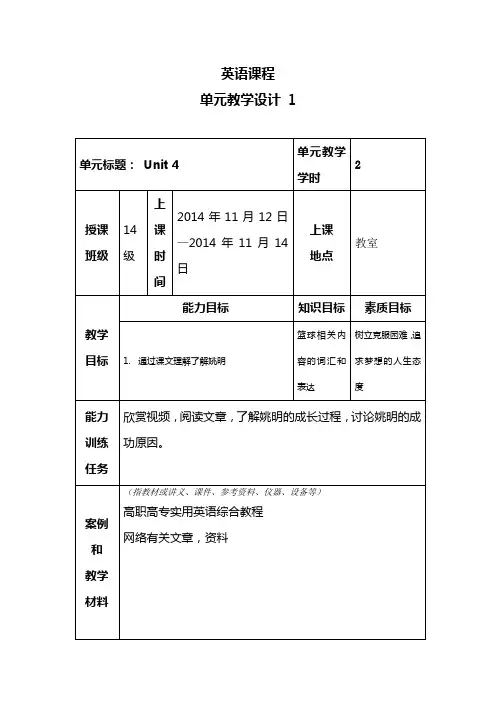
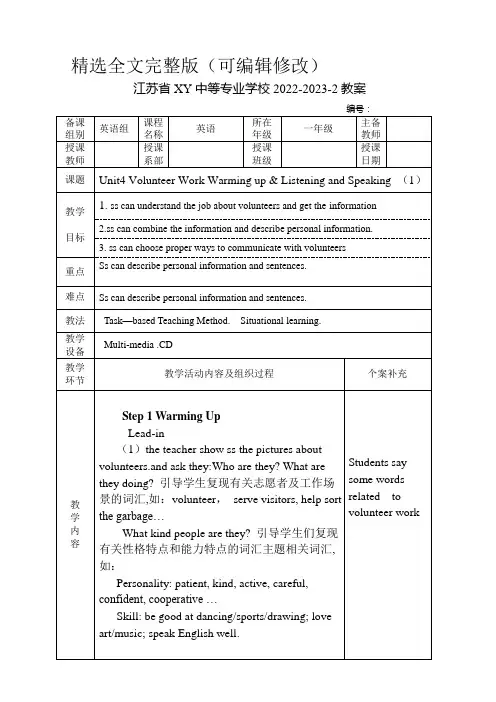
精选全文完整版(可编辑修改)
江苏省XY中等专业学校2022-2023-2教案
江苏省XY中等专业学校2022-2023-2教案
江苏省XY中等专业学校2022-2023-2教案
江苏省XY中等专业学校2022-2023-2教案
江苏省XY中等专业学校2022-2023-2教案
江苏省XY中等专业学校2022-2023-2教案
在这一学年中,不仅在业务能力上,还是在教育教学上都有了一定的提高。
金无足赤,人无完人,在教学工作中难免有缺陷,例如,课堂语言平缓,语言不够生动,理论知识不够,教学经验不足,组织教学能力还有待提高。
在今后的工作中,我将更严格要求自己,努力工作,发扬优点,改正缺点。

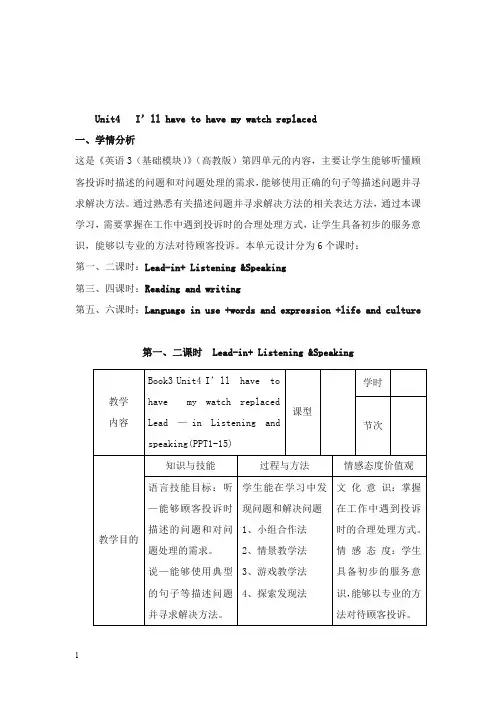
Unit4 I’ll have to have my watch replaced
一、学情分析
这是《英语3(基础模块)》(高教版)第四单元的内容,主要让学生能够听懂顾客投诉时描述的问题和对问题处理的需求,能够使用正确的句子等描述问题并寻求解决方法。
通过熟悉有关描述问题并寻求解决方法的相关表达方法,通过本课学习,需要掌握在工作中遇到投诉时的合理处理方式,让学生具备初步的服务意识,能够以专业的方法对待顾客投诉。
本单元设计分为6个课时:
第一、二课时:Lead-in+ Listening &Speaking
第三、四课时:Reading and writing
第五、六课时:Language in use +words and expression +life and culture 第一、二课时 Lead-in+ Listening &Speaking
第三、四课时 Reading and writing
第五、六课时 Language in use +words and expression +life and culture。
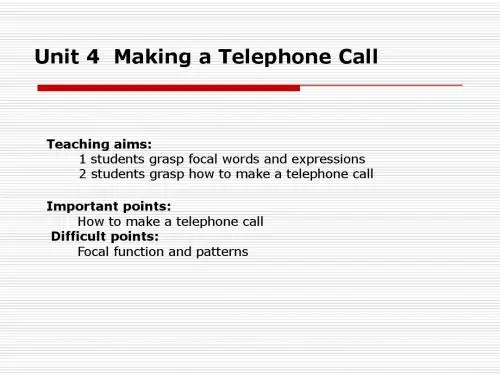
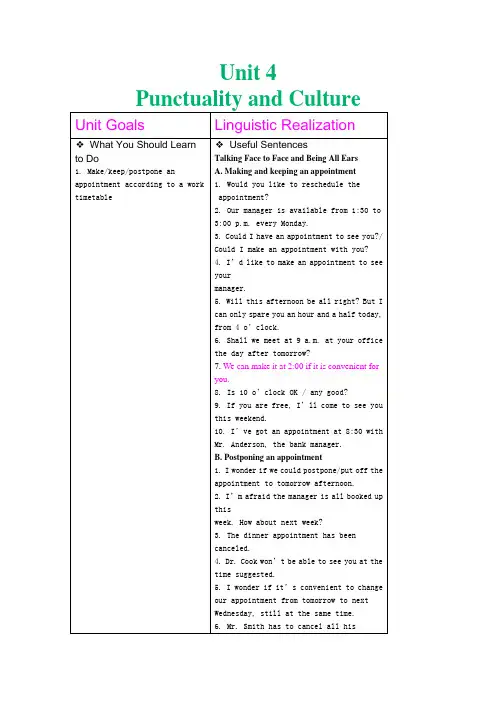
Unit 4Key and TranslationSECTION ITalking Face to FaceThe topic area of Talking Face to Face in this unit is to make a timetable or a schedule. The focus of functions is on the patterns that are appropriate for making appointments and arranging activities in different situations.Imitating Mini-Talks1 Work in pairs. Look at the pictures and practice the following mini-talks about schedules and timetables.Acting out the Tasks2Work in pairs and act out the tasks by following the above mini-talks.Studying Timetables and Schedules3Timetables and schedules are important in planning our activities. Now let’s read the following timetable and schedule.马克的时间表(2011年6月)Following Sample Dialogues4Read the following sample dialogues and try to perform your own tasks. Putting Language to Use56SECTION II Being All EarsLearning Sentences for Workplace Communication 1 Listen to 10 sentences for workplace communication cross-referenced with their ChineseScript:1) Would you please arrange a meeting for me with Dr. Johnson?2) I’d like to make an appointment to see Mr. Black.3) I’d like to confirm our meeting tomorrow afternoon.4) The train is due to arrive at 9 o’clock, but i t has been delayed for one hour.5) I’d like to see you tomorrow if you have time.6) I’m wondering if you’d like to come and discuss the new plan in my office.7) I’d like to change the appointment from Tuesday to Wednesday.8) Could we put it off to next week?9) Let’s say 3:30 Friday afternoon.10) Please tell me the departure and arrival time.2Listen to the following sentences for workplace communication in Column A and match eachScript:1) We can make it 2:00 p.m. if that is convenient for you.2) Our manager is available every Monday afternoon.3) Shall we say 8:30 tomorrow morning at my office?4) I’d like to take the 12:15 flight for Beijing.5) The flight leaves at 3:50, but you must check in one hour before departure.6) I plan to leave for Shanghai on an early morning flight.7) There’s a flight to Dalian at 7:50 a.m. tomorrow.8) My flight leaves at 11:15 a.m. and due to arrive at about 3:30 p.m. local time.9) I’m fully occupied this week.10) Eight o’clock next Monday morning would be great.Key:1-i, 2-j, 3-d, 4-c, 5-f, 6-e, 7-h, 8-g, 9-a, 10-b3 Listen to 6 sentences for workplace communication and choose their right responses. Script:1. I’m afraid we have to change the appointment. I have something important to do.2. I just called to confirm our appointment at 10 a.m. tomorrow.3. Can you make it Monday next week?4. When does the flight arrive in London?5. Is the flight from Shanghai on time?6. I’ll be free from 2:00 tomorrow afternoon. D o you think it’s convenient for you?Key:1. A 2. A 3.A 4. B 5.B 6. DHandling a Dialogue4Listen to a dialogue and supply the information by filling in Susan’s schedule.key:March 11, Monday have a meetingMarch 12, Tuesday have dinner with friendsMarch 13, Wednesday an appointment with Mr. PetersonMarch 14, Thursday extra work in the officeMarch 15, Friday go to evening classesUnderstanding a Short Speech/Talk5 Now listen to a short tour guide speech and fill up the blanks according to what you have6Listen to the speech again and complete the information in Column A with the right choices inSECTION III Trying Your Hand Practicing Applied Writing1 Fill in the office hours by making use of the information in the passage that follows.Writing Sentences and Reviewing Grammar3. He told us he (had) joined the Party in 2010.10. He lived in London until 2010.SECTION IV Maintaining a Sharp Eye Passage I Punctuality Pays!Information related to the reading passageAmericans and Europeans consider time to be an asset that can be spent and saved; therefore, proper scheduling of time and its appropriate allocation to various competing tasks is an important part of organizational management. Variations in time use are expected to influence performance and stress, as well as other outcomes. It is a vital strategic element. The large amount of management processes and methods developed to improve performance by managing time use proves the importance placed on time. Here are a few famous quotes and sayings about time and punctuality:Do you love life? Thus do not squander time, for that’s the stuff life is made of. —Benjamin FranklinTime wastes things away, and all things grow old through time. — AristotleTime takes all and gives all. — Giordano BrunoLost wealth may be replaced by industry, lost knowledge by study, lost health by temperance or medicine, but lost time is gone for ever. — Samuel SmilesFew things tend more to alienate friendship than a want of punctuality in our engagements. I have known the breach of a promise to dine or sup to break up more than one intimacy. — William Hazlitt Punctuality is the soul of business. — Thomas Chandler HaliburtonWhile we keep a man waiting, he reflects on our shortcomings. — Anonymous Language Points1Explanation of difficult sentences1. (Para. 1)One of the cultural differences that tend to annoy Americans has to do withunderstanding of punctuality.Analysis: Has to do with is a phrase meaning has a specified relationship with It is the predicate of the sentence.That introduces a restrictive relative clause modifying differences.Translation: 有一种常会惹恼美国人的文化差异可能关系到对守时的不同理解。
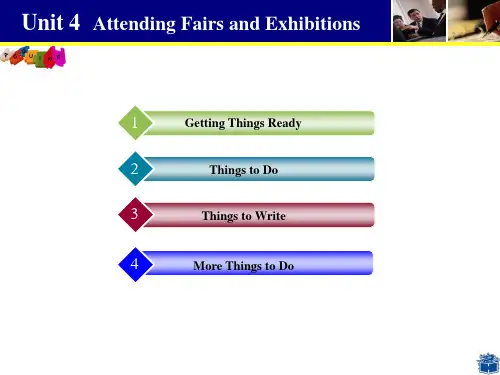
中等专业学校2023-2024-1教案编号:中等专业学校2023-2024-1教案中等专业学校2023-2024-1教案教学内容Step 4 :Post-reading Analyze and discuss :Underline the following key words, phrases and sentences on the product page, explain their meanings and main usages, and give complete the construction. Review the important words and expressions. How to reply a complaint letter?Ss read thepassageagain andunderline the key words, phrases and sentences.Ss learn theusages of theimportant wordsand phrases.中等专业学校2023-2024-1教案教学内容写作评价标准i.与消费者评价相关的词汇与句型是否使用正确?ii.表达是否清晰且符合逻辑?iii.语法运用是否正确?iv.单词拼写是否正确,标点符号使用是否规范?Step3:Culture UnderstandingRead and answer:1)Who do not like deadlines in business ?A.ChineseB.SpanishC.TurksD.Filipinos2)In which countries should we take care not toshare personal information?A.ChinaB.TurkeyC.GermanyD.FranceGroup TaskSurf the internet or access other resources toget to know different business cultures.Share them with your classmates.Evaluation:Learn the newwords andphrasesappearing in thepassage.中等专业学校2023-2024-1教案教学内容(2)Read and group:原因状语从句:since,because,as,for...让步状语从句:even if/though, though,although,while,as...目的状语从句:in order that, so that, in case...(3)Step 3: Presentation1.Read and underline.The teacher explains the basic grammar structureand application rules of attributive clauses.I got up early so that I could get to school on time. 目的状语从句Even though I got up early, I didn’t get to schoolon time.让步状语从句Since I got up early, I got to school on time. 原因状语从句Even if/though Since So that2 1,7 5,8Ss read thesentences andsummarize theusages ofgrammar.Ss learn thebasic forms ofattributive clauses中等专业学校2023-2024-1教案。
Unit 4 CongratulationsLecturer: Liu JunTeaching Objectives:Students (Ss) will be able to:●Have a deeper understanding about the whole sides of Internet and the future development of Internet.●Mastering the key language points and grammatical structures in the text.●Congratulating and responding to congratulations.●Translating skill:Amplification●Writing and replying to: a congratulation letter/ a thank-you note/ a gift card Teaching Focus:●Vocabulary: occasion, admit, promote, alienate, revolution, prosperous, overnight, economy,prejudice, symbol, desire, coordinate, at best, think of…as, access , isolate, be responsible for,a sense of, etc.●The development of internet●Applied writing: Congratulation CardTime Allotment:Teaching Methods:●Explanation●Group discussion●Questions and answers●Multi-media●PerformanceTeaching Procedure:1st Period1. Pre-class Work:Ask students●How do you celebrate when you are admitted to college?●Do you know some phrases to give Congratulations?What a wonderful performance!I’d like to congratulate you on your success.Well done.I feel happy for you.I must congratulate you.Please accept my hearty congratulations.Congratulations on + sth. / doing sth.Congratulate (v.) sb. on + sth. / doing sth.→I’d like to congratulate you on your success /promotion /victory / progress.●Do you know how to reply to congratulations?I’m lucky.Thank you very much.It’s very nice of you to say so.Please accept my deep gratitude for your support.Thanks for your kind words.3.SpeakingDividing the students into groups of four or fiveTask 1Ask the students to work in groups and practice sample dialogues1 Offer your congratulations to your friend on his (her) success in a writing contest.2 Imagine your partner has been promoted to a higher position. Offer your congratulations tohim.3. Imagine your friend Sally moved to a new house. Offer your congratulations to her.Ask the students to work in groups to1) Understand the short dialogues on Page 75-76 of the Textbook2) To act outTask 2Ask each group to choose one of the situations to create further the dialoguesUse the information given below to create a role-play.The Hunters have just had a new son. The husband, Mr. Hunter, feels very happy about it. Their friends come to congratulate them.Act out in front of the class4Focus on Listening1) Word tips:●Occasion: a particular time, especially when something happens or has happenede.g.: At the wedding he sang a song specially written for the occasion.on occasion: sometimes, but not often 偶尔on the occasion of…在……之际●Admit: to agree that something is true, especially unwillinglye.g.: She admitted (that) she had made a mistake.升,推广e.g.: Our Medias should further promote understanding of China and the world andcommunicate.e.g.: We launch a big advertising campaign to promote our new product.2) Listening tasks:Short conversations and finish Part B and C on pages 78-792nd Period1. Lead-in story:T asks Ss the following questions on the movie Y ou’ve Got Mail?What is the relationship between Kathleen and Joe in real life?(Antagonists at feud with each other)Is that the case on the Internet?(No. They have grown to love each other.)You’ve Got MailStaring: Tom Hanks, Meg RyanRelease Date: December, 1998Story: Set in New York City, Kathleen Kelly (Meg Ryan), for many years, has run her late mother’s quaint children’s bookstore called” The Shop Around the Corner”. She has a writer boyfriend, but has been recently sending honest and intimate e-mails over AOL to a man that she first met in an Over 30 chat room, but they have decided to keep their identities anonymous. What Kathleen doesn’t know is that her secret e-mail buddy is a actually Joe Fox (Tom Hanks), who has his own hyper and giddy girlfriend, and is about to open a more high-profile book store on the same street, threatening Kathleen’s business.The gimmick for the film is that these two people have grown to love each other over the Internet, even though they are feuding in real life.2. Intensive Reading (Text A) Pre-reading:After the lead-in story and questions, the teacher asks the students to look at the theme of Text A and try to answer the questions as follow:1) Suggest synonyms for “virtual world” and “virtual life” (cyberspace, cyberia, ether world, virtual reality, Internet world, net world, etc.)2) Do you often get on the Internet in you spare time?3) What do you usually do when you are online?4) What are some good things about the Internet?And what are the bad things?Let students watch a video of FIVE minutes about The History of Internet3. Background information:Silicon Valley4. Assignment1. Review the text.2. Imaginative writing: The teacher gives the students the following paragraph:For the past two weeks, other participants of the Net Survival Contest and I have been shut up in bare hotel rooms. Our only link to the real world has been a computer that is hooked up to the Internet. We have relied on it, not only for food, bed sheets and other daily necessities, but also to set up an e-business of our own.Ss will complete the next paragraph beginning with: Now it is time for me to walk out into the light of day again... They will give their imagination in a few paragraphs.3rd– 4th Periods1.Warming-up Activities:Ask some students to share their oral passage with the whole class.2. Intensive Reading: Read and answer the questions1. How did Britain benefit from the Industrial Revolution?2. Were the newly rich accepted and respected by British society?3. Which country finished the Industrial Revolution?4. It is well-known that Silicon Valley is a good example in the world. Do you think it has become a leading part of America?5. Why can a Chinese company install the latest computer technology much more cheaply than an American company?6. Why can’t America finish the Internet Revolution?7. Do you believe China may finish the Internet Revolution?2. While-reading (Text A)1) Text OrganizationAfter scanning the whole text, students are required to find the top sentences of each paragraph. And try to divide the text into 3 parts and summarize the main idea of each part.Part 1 (Para 1): The historical influence of the Industrial Revolution on Britain and America. Part 2 (Para 2-4): The present influence of the Internet Revolution on three main countries: America, China, and India.Part 3 (Para 5): The possible future result of the development of the Internet in China.2) finish tasks on page 82-83, and check the answers.3). Language pointsExplain the difficult words and sentences, including language and grammatical points.Focus:Revolution: change, a change in the way a country is governed, usually to a different political system and often using violence or war. 革命,变革e.g.: The French Revolution changed France from a monarchy to a republic.●Decade: a period of ten years. 十年e.g.: In the last decade telecommunication technology has come a long way.●Prosperous: adj. successful, usually by earning a lot of money。